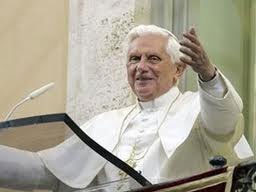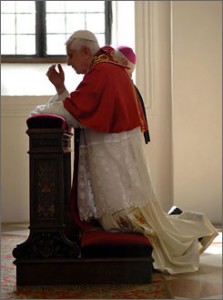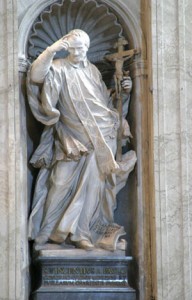HUMAN HISTORY IS A HISTORY OF SALVATION – Psalm 126
VATICAN CITY, OCT. 12, 2011 (Zenit.org).- Here is a translation of the Italian-language catechesis Benedict XVI gave today during the general audience held in St. Peter’s Square. The Pope today continued his catecheses on prayer with a reflection on Psalm 126.
* * *
In the previous catecheses, we have meditated on a number of psalms of lament and of trust. Today, I would like to reflect with you on a notably joyous psalm, a prayer that sings with joy the marvels of God. It is Psalm 126 — according to Greco-Latin numbering, 125 — which extols the great things the Lord has done with His people, and which He continues to do with every believer.
The psalmist begins the prayer in the name of all Israel by recalling the thrilling experience of salvation:
“When the Lord restored the fortunes of Zion,
we were like those who dream.
Then our mouth was filled with laughter,
and our tongue with shouts of joy” (Verses 1-2a).
The psalm speaks of “restored fortunes”; that is, restored to their original state in all their former favorability. It begins then with a situation of suffering and of need to which God responds by bringing about salvation and restoring the man who prays to his former condition; indeed, one that is enriched and even changed for the better. This is what happens to Job, when the Lord restores to him all that he had lost, redoubling it and bestowing upon him an even greater blessing (cf. Job 42:10-13), and this is what the people of Israel experience in returning to their homeland after the Babylonian exile.
This psalm is meant to be interpreted with reference to the end of the deportation to a foreign land: The expression “restore the fortunes of Zion” is read and understood by the tradition as a “return of the prisoners of Zion.” In fact, the return from exile is paradigmatic of every divine and saving intervention, since the fall of Jerusalem and the deportation into Babylon were devastating experiences for the Chosen People, not only on the political and social planes, but also and especially on the religious and spiritual ones. The loss of their land, the end of the davidic monarchy and the destruction of the Temple appear as a denial of the divine promises, and the People of the Covenant, dispersed among the pagans, painfully question a God who seems to have abandoned them.
Therefore, the end of the deportation and their return to their homeland are experienced as a marvelous return to faith, to trust, to communion with the Lord; it is a “restoring of fortunes” that involves a conversion of heart, forgiveness, re-found friendship with God, knowledge of His mercy and a renewed possibility of praising Him (cf. Jeremiah 29:12-14; 30:18-20; 33:6-11; Ezekiel 39:25-29). It is an experience of overflowing joy, of laughter and of cries of jubilation, so beautiful that “it seems like a dream.” Divine help often takes surprising forms that surpass what man is able to imagine; hence the wonder and joy that are expressed in this psalm: “The Lord has done great things.” This is what the nations said, and it is what Israel proclaims:
“Then they said among the nations,
‘the Lord has done great things for them.’
The Lord has done great things for us;
we are glad” (Verses 2b-3).
God performs marvelous works in the history of men. In carrying out salvation, He reveals Himself
to all as the powerful and merciful Lord, a refuge for the oppressed, who does not forget the cry of the poor (cf. Psalm 9:10,13), who loves justice and right and of whose love the earth is filled (cf. Psalm 33:5). Thus, standing before the liberation of the People of Israel, all the nations recognize the great and marvelous things God has accomplished for His People, and they celebrate the Lord in His reality as Savior.
And Israel echoes the proclamation of the nations, taking it up and repeating it once more — but as the protagonist — as a direct recipient of the divine action: “The Lord has done great things for us”; “for us” or even more precisely, “with us,” in hebrew ‘immanû, thus affirming that privileged relationship that the Lord keeps with His chosen ones, and which is found in the nameEmmanuel, “God with us,” the name by which Jesus would be called, His complete and full revelation (cf. Matthew 1:23).
Dear brothers and sisters, in our prayer we should look more often at how, in the events of our own lives, the Lord has protected, guided and helped us, and we should praise Him for all He has done and does for us. We should be more attentive to the good things the Lord gives to us. We are always attentive to problems and to difficulties, and we are almost unwilling to perceive that there are beautiful things that come from the Lord. This attention, which becomes gratitude, is very important for us; it creates in us a memory for the good and it helps us also in times of darkness. God accomplishes great things, and whoever experiences this — attentive to the Lord’s goodness with an attentiveness of heart — is filled with joy. The first part of the psalm concludes on this joyous note. To be saved and to return to one’s homeland from exile are like being returned to life: Freedom opens up to laughter, but is does so together with a waiting for a fulfillment still desired and implored. This is the second part of our psalm, which continues: (more…)
Tags: catholic, catholic podcast, catholic prayer, cathollc spirituality, pope benedict xvi, prayer, psalm 126
This entry was posted on Wednesday, October 12th, 2011 at 5:48 pm
You can follow any responses to this entry through the RSS 2.0 feed.
Vatican City, Oct 6, 2010 / 03:54 pm (CNA/EWTN News).- Anticipating Thursday’s celebration of the Feast of Our Lady of the Rosary, the Holy Father called on the faithful to make an effort to rediscover the prayer. He urged Christians to seek intercession, protection and personal encounter with Christ through the “simple but efficient prayer,” especially during the Marian month of October.
Greeting the faithful in 10 different languages during Wednesday’s general audience, the Holy Father spoke of the Rosary as “a particular prayer of the Church and a spiritual weapon for each of us.”
He prayed that the meditation of Jesus and Mary’s life through the Rosary might be, “for all of us, light on the evangelical path of spiritual renewal and conversion of heart.”
Speaking in Portuguese, but referring to all people, he invited families to join together with the Virgin Mary so as to cooperate fully with the salvific designs of God. In Croatian, he said to ask for her intercession and protection for each person and family, exhorting prayers also for vocations to the priesthood and religious life.
In still other languages, 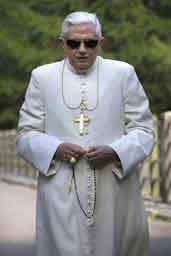 he asked that the faithful “rediscover the value” of the “simple but efficient prayer” of the Rosary “as a way for a personal encounter with Christ.”
he asked that the faithful “rediscover the value” of the “simple but efficient prayer” of the Rosary “as a way for a personal encounter with Christ.”
“October,” he said in the Italian greeting that concluded his public words on Wednesday, “is the month of the Holy Rosary, which invites us to value this prayer so dear to the tradition of the Christian people.”
Addressing some of the special guests at the audience, he said, “I invite you, dear young people, to make of the Rosary your daily prayer. I encourage you, dear sick, to grow, thanks to the recitation of the Rosary, in the trusting abandonment to the hands of God. I exhort you, dear newlyweds, to make of the Rosary a constant contemplation of the mysteries of Christ.” – CNA
Tags: catholic, catholic podcast, catholic prayer, cathollc spirituality, feast of our lady of the rosary, holy father, intercession, month of the holy rosary, prayer, prayer of the rosary, virgin mary
This entry was posted on Sunday, October 9th, 2011 at 8:29 pm
You can follow any responses to this entry through the RSS 2.0 feed.
Heart of Hope Part 4 – The healing hand of Christ, seeing the will of God, and how we suffer love. The tale of the two criminals on the cross next to Christ on Gologotha.
[powerpress = “deacon-james-keating”]
 Deacon James Keating, PhD, the director of Theological Formation for the Institute for Priestly Formation, located at Creighton University, in Omaha, is making available to “Discerning Hearts” and all who listen, his series of programs entitled “The Heart of Hope”.
Deacon James Keating, PhD, the director of Theological Formation for the Institute for Priestly Formation, located at Creighton University, in Omaha, is making available to “Discerning Hearts” and all who listen, his series of programs entitled “The Heart of Hope”.
This extraordinarily popular series explores the work of suffering in the Christian life and how God can use it to transform the heart of the individual and the world. 
The “Heart of Hope”  tackles a very tough subject…the gift of suffering in the Christian life. Deacon Keating guides us well.
For more information on the “Institute of Priestly Formation” and for other material available by Deacon Keating, just click here
Don’t forget to pickup a copy of “Communion with Christ” , it is one of the best audio sets on prayer…ever!
Check out Deacon Keating’s “Discerning Heart” page
Tags: catholic, catholic podcast, catholic prayer, cathollc spirituality, Deacon James Keating, Deacon Keating, institute for priestly formation, PhD, theological formation
This entry was posted on Thursday, October 6th, 2011 at 10:23 pm
You can follow any responses to this entry through the RSS 2.0 feed.
St. Bruno was one of the most exceptional scholars, teachers, prayer warriors of his time : “…a prudent man whose word was rich in meaning.” I think the key was the gift of great humility. He must have been very close to Our Lady.
: “…a prudent man whose word was rich in meaning.” I think the key was the gift of great humility. He must have been very close to Our Lady.
The Order founded by Bruno — the Carthusians — is one of the strictest in the Church. Carthusians follow the Rule of St. Benedict, but accord it a most austere interpretation; there is perpetual silence and complete abstinence from flesh meat (only bread, legumes, and water are taken for nourishment). Bruno sought to revive the ancient eremitical (hermit)Â way of life. His Order enjoys the distinction of never becoming unfaithful to the spirit of its founder, never needing a reform.
Quote:
Rejoice, my dearest brothers, because you are blessed and because of the bountiful hand of God’s grace upon you. Rejoice, because you have escaped the various dangers and shipwrecks of the stormy world. Rejoice because you have reached the quiet and safe anchorage of a secret harbor. Many wish to come into this port, and many make great efforts to do so, yet do not achieve it. Indeed many, after reaching it, have been thrust out, since it was not granted them from above. By your work you show what you love and what you know. When you observe true obedience with prudence and enthusiasm, it is clear that you wisely pick the most delightful and nourishing fruit of divine Scripture.
~from a letter by Saint Bruno to the Carthusians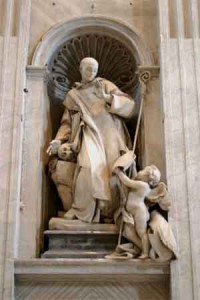
Collect:
Father,
you called St. Bruno to serve you in solitude.
In answer to his prayers
help us to remain faithful to you.
amid the changes of this world.
We ask this through our Lord Jesus Christ, your Son,
who lives and reigns with you and the Holy Spirit,
one God, forever and ever. Amen.
St. Bruno is the patron of diabolic possession. St. Bruno, confessor, ecclesiastical writer, and founder of the Carthusian Order. He was born at Cologne about the year 1030; died October 6, 1101.
Tags: Carthusians, catholic, catholic podcast, catholic prayer, cathollc spirituality, humility, prayer, silence, st bruno
This entry was posted on Thursday, October 6th, 2011 at 8:37 am
You can follow any responses to this entry through the RSS 2.0 feed.
Psalm 23 – Vatican.va
Turning to the Lord in prayer implies a radical act of trust, in the awareness that one is entrusting oneself to God who is good, “merciful and gracious, slow to anger, and abounding in steadfast love and faithfulness†(Ex 34:6-7; Ps 86[85]:15; cf. Joel 2:13; Jon 4:2; Ps 103 [102]:8; 145[144]:8; Neh 9:17). For this reason I would like to reflect with you today on a Psalm that is totally imbued with trust, in which the Psalmist expresses his serene certainty that he is guided and protected, safe from every danger, because the Lord is his Shepherd. It is Psalm 23 [22, according to the Greco-Latin numbering], a text familiar to all and loved by all.
“The Lord is my shepherd, I shall not wantâ€: the beautiful prayer begins with these words, evoking the nomadic environment of sheep-farming and the experience of familiarity between the shepherd and the sheep that make up his little flock. The image calls to mind an atmosphere of trust, intimacy and tenderness: the shepherd knows each one of his sheep and calls them by name; and they follow him because they recognize him and trust in him (cf. Jn 10:2-4).
He tends them, looks after them as precious possessions, ready to defend them, to guarantee their well-being and enable them to live a peaceful life. They can lack nothing as long as the shepherd is with them. The Psalmist refers to this experience by calling God his shepherd and letting God lead him to safe pastures: “He makes me lie down in green pastures. He leads me beside still waters; he restores my soul. He leads me in paths of righteousness for his name’s sake†(Ps 23[22]:2-3).
The vision that unfolds before our eyes is that of green pastures and springs of clear water, oases of peace to which the shepherd leads his flock, symbols of the places of life towards which the Lord leads the Psalmist, who feels like the sheep lying on the grass beside a stream, resting rather than in a state of tension or alarm, peaceful and trusting, because it is a safe place, the water is fresh and the shepherd is watching over them.
And let us not forget here that the scene elicited by the Psalm is set in a land that is largely desert, on which the scorching sun beats down, where the Middle-Eastern semi-nomad shepherd lives with his flock in the parched steppes that surround the villages. Nevertheless the shepherd knows where to find grass and fresh water, essential to life, he can lead the way to oases in which the soul is “restored†and where it is possible to recover strength and new energy to start out afresh on the journey.
As the Psalmist says, God guides him to “green pastures†and “still watersâ€, where everything is superabundant, everything is given in plenty. If the Lord is the Shepherd, even in the desert, a desolate place of death, the certainty of a radical presence of life is not absent, so that he is able to say “I shall not wantâ€. Indeed, the shepherd has at heart the good of his flock, he adapts his own pace and needs to those of his sheep, he walks and lives with them, leading them on paths “of righteousnessâ€, that is, suitable for them, paying attention to their needs and not to his own. The safety of his sheep is a priority for him and he complies with this in leading his flock.
Dear brothers and sisters, if we follow the “Good Shepherd†— no matter how difficult, tortuous or long the pathways of our life may seem, even through spiritual deserts without water and under the scorching sun of rationalism — with the guidance of Christ the Good Shepherd, we too, like the Psalmist, may be sure that we are walking on “paths of righteousness†and that the Lord is leading us, is ever close to us and that we “shall lack nothingâ€. For this reason the Psalmist can declare his calm assurance without doubt or fear: “Even though I walk through the valley of the shadow of death, I fear no evil; for you are with me; your rod and your staff they comfort me†(v. 4). (more…)
Tags: catholic, catholic podcast, catholic prayer, cathollc spirituality, jesus the good shepherd, psalm 23, the Psalmist
This entry was posted on Wednesday, October 5th, 2011 at 3:41 pm
You can follow any responses to this entry through the RSS 2.0 feed.
 Saint Maria Faustina Kowalska –The Humble Instrument
Saint Maria Faustina Kowalska –The Humble Instrument
The article below is found on the Divine Mercy website – I highly encourage you to visit there (they are doing wonderful things)!
Sister Faustina was a young, uneducated, nun in a convent of the Congregation of Sisters of Our Lady of Mercy in Cracow, Poland during the 1930’s. She came from a very poor family that struggled on their little farm during the years of World War I. She had only three years of very simple education, so hers were the humblest tasks in the convent, usually in the kitchen or garden. However, she received extraordinary revelations or messages from Our Lord Jesus. Jesus asked Sr. Faustina to record these experiences, which she compiled in notebooks. These notebooks are known today as the Diary of Saint Maria Faustina Kowalska and the words contained within are God’s loving message of Divine Mercy. Though the Divine Mercy message is not new to the teachings of the Church, Sr. Faustina’s Diary sparked a great movement, and a strong and significant focus on the mercy of Christ. Pope John Paul II canonized Sr. Faustina in 2000 making her the “first saint of the new millennium.” Speaking of Sr. Faustina and the importance of the message contained in her Diary, the Pope call her “the great apostle of Divine Mercy in our time.” Today, we continue to rely of Saint Faustina as a constant reminder of the message to trust in Jesus’ endless mercy, and to live life mercifully toward others. We also turn to her in prayer and request her intercession to our merciful Savior on our behalf. At the National Shrine of The Divine Mercy, we include the following in our 3 o’clock prayers:
Saint Faustina,
You told us that your mission would continue after your death and that you would not forget us. Our Lord also granted you a great privilege, telling you to “distribute graces as you will, to who you will, and when you will.” Relying on this, we ask your intercession for the graces we need, especially for the intentions just mentioned. Help us, above all, to trust in Jesus as you did and thus to glorify His mercy every moment of our lives. Amen
–from DivineMercy.org
Here is my favorite (if that is possible) of the notebook V “Conversation” dialogues
The Diary of
St. Â M. Faustina Kowalska
Perpetually Professed member
of the
Congregation of Sisters of
Our Lady of Mercy
NOTEBOOK V
Conversation of the Merciful God with a Soul Striving after Perfection.
Jesus: I am pleased with your efforts, O soul aspiring for perfection, but why do I see you so often sad and depressed? Tell Me, My child, what is the meaning of this sadness, and what is its cause?
Soul: Lord, the reason for my sadness is that, in spite of my sincere resolutions, I fall again into the same faults. I make resolutions in the morning, but in the evening I see how much I have departed from them.
Jesus: You see what you are of yourself. The cause of your falls is that you rely too much upon yourself and too little on Me. But let this not sadden you so much. You are dealing with the God of mercy, which your misery cannot exhaust. Remember, I did not allot only a certain number of pardons.
Soul: Yes, I know all that but the great temptations assail me, and various doubts waken within me and moreover, everything irritates and discourages me.
Jesus: My child, know that the greatest obstacles to holiness are discouragement and an exaggerated anxiety. These will deprive you of the ability to practice virtue. All temptations united together ought not disturb your interior peace, not even momentarily. Sensitiveness and discouragement are fruits of self love. You should not become discouraged, but strive to make My love reign in place of your self love. Have confidence, My child. Do not lose heart in coming for pardon, for I am always ready to forgive you. As often as you beg for it, you glorify My mercy.
Soul: I understand what is the better thing to do, what pleases You more, but I encounter great obstacles in acting on this understanding.
Jesus: My child, life on earth is a struggle indeed; a great struggle for My kingdom. But fear not, because you are not alone. I am always supporting you, so lean on Me as you struggle, fearing nothing. Take the vessel of trust and draw from the fountain of life – for yourself, but also for other souls, especially such as are distrustful of My goodness.
Soul: O Lord, I feel my heart being filled with Your love and the rays of Your mercy and love piercing my soul. I go, Lord, at Your command. I go to conquer souls. Sustained by Your grace, I am ready to follow You Lord, not only to Tabor, but also to Calvary. I desire to lead souls to the fount of Your mercy so that the splendor of Your mercy may be reflected in all souls, and the home of our Father be filled to overflowing. And when the enemy begins to attack me, I shall take refuge behind the shield of Your mercy.
Pray the Divine Mercy Prayer [powerpress = “devotionals-prayers”]
The Discerning Hearts Divine Mercy Novena Page
Tags: catholic, catholic podcast, catholic prayer, cathollc spirituality, divine mercy, divine mercy message, Faustina Kowalska, john paul ii, mystic, mystic of the Church, national shrine of the divine mercy, Saint Faustina, saint maria faustina kowalska, Sister Faustina, st faustina
This entry was posted on Wednesday, October 5th, 2011 at 12:04 am
You can follow any responses to this entry through the RSS 2.0 feed.
Msgr. Esseff shares the discovery that changed his life!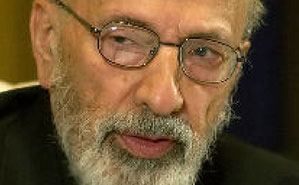
[powerpress]
He tells the stories of growning up in a deformed world and the awakening to the power given at his baptism and the realization our true identity. Our baptism conforms us into Christ, we increase in the Divine Life of Jesus Christ. Jesus dwells with us…transforming us. He shares very special stories of his parents and brothers and sisters. Â The suffering in our hearts, the heart that was made to love, has the power because of Jesus present in us to build the Kingdom of Love. Â Loving and Living with the Heart of Jesus. Â This is a remarkable sharing.
visit Msgr. Esseff’s website Building a Kingdom of Love
Tags: catholic, catholic podcast, catholic prayer, cathollc spirituality, msgr. john esseff
This entry was posted on Sunday, October 2nd, 2011 at 11:06 pm
You can follow any responses to this entry through the RSS 2.0 feed.
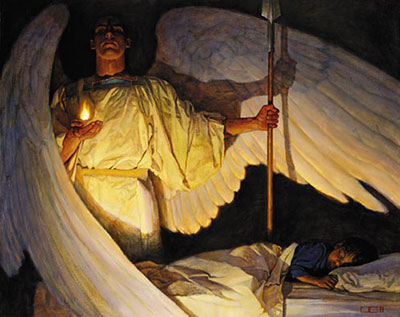
My Guardian Dear,
to whom His love commits me here,
ever this day be at my side,
to light and to guard,
to rule and guide.
Amen.
For they are ministering spirits, sent for service, for the sake of those who will inherit salvation†(Heb 1:14)
 O holy Guardian Angel, my dear friend and solicitous guide on the dangerous way of life, to thee be heartfelt thanks for the numberless benefits which have been granted me through thy love and goodness and for the powerful help by which thou hast preserved me from so many dangers and temptations. I beg of thee, let me further experience thy love and thy care. Avert from me all danger, increase in me horror for sin and love for all that is good. Be a counselor and consoler to me in all the affairs of my life, and when my life draws to a close, conduct my soul through the valley of death into the kingdom of eternal peace, so that in eternity we may together praise God and rejoice in His glory. Through Jesus Christ Our Lord.
O holy Guardian Angel, my dear friend and solicitous guide on the dangerous way of life, to thee be heartfelt thanks for the numberless benefits which have been granted me through thy love and goodness and for the powerful help by which thou hast preserved me from so many dangers and temptations. I beg of thee, let me further experience thy love and thy care. Avert from me all danger, increase in me horror for sin and love for all that is good. Be a counselor and consoler to me in all the affairs of my life, and when my life draws to a close, conduct my soul through the valley of death into the kingdom of eternal peace, so that in eternity we may together praise God and rejoice in His glory. Through Jesus Christ Our Lord.
Amen.
O Angel of God, make me worthy of thy tender love, thy celestial companionship and thy never-failing protection!
For He will give His angels charge of you to guard you in all your ways.
On their hands they will bear you up, lest you dash your foot against a stone. (Ps 91)
The Holy Angels, and in particular our Guardian Angels, are such a wonderful gift to us from the Father! Let us give thanks to Him for his generosity and to our Guardian Angel for their presence in our lives!
It’s really important to understand the difference in the angels beyond all the New Age silliness. There are the Holy Angels (we love them and they love us) and the fallen angels (bad, bad, bad)…it’s what discernment and spiritual warfare, on many levels, are all about.
Bruce and I, thanks to Fr. Damien Cook, had the opportunity to speak to Fr. Titus Kieninger of Opus Sanctorum Angelorum about the role of Holy Angels. Be prepared…you’ll have to listen a couple of times to this discussion;  Fr. Titus Kieninger gives so much information about their mission that you’ll need hear a few times to get it all.
[powerpress]
Be sure to visit Opus Sanctorum Angelorum
Let us affectionately love His angels as counselors and defenders appointed by the Father and placed over us. They are faithful; they are prudent; they are powerful; Let us only follow them, let us remain close to them, and in the protection of the God of heaven let us abide. ~ St. Bernard of Clairvaux
Tags: Angel of God, catholic, catholic podcast, catholic prayer, cathollc spirituality, feast of the guardian angels, Fr. Titus Kieninger, Guardian Angel, holy angels, holy guardian angel, Opus Sanctorum Angelorum, ORC
This entry was posted on Sunday, October 2nd, 2011 at 12:33 am
You can follow any responses to this entry through the RSS 2.0 feed.
Heart of Hope Part 3 – What is Redemptive Suffering…using love and the energy of love to redirect pain as an intercessory prayer for another…how it makes sense and is no longer meaningless
[powerpress = “deacon-james-keating”]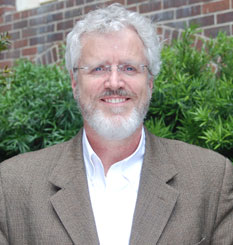
Deacon James Keating, PhD, the director of Theological Formation for the Institute for Priestly Formation, located at Creighton University, in Omaha, is making available to “Discerning Hearts” and all who listen, his series of programs entitled “The Heart of Hope”.
This extraordinarily popular series explores the work of suffering in the Christian life and how God can use it to transform the heart of the individual and the world. 
The “Heart of Hope”  tackles a very tough subject…the gift of suffering in the Christian life. Deacon Keating guides us well.
For more information on the “Institute of Priestly Formation” and for other material available by Deacon Keating, just click here
Don’t forget to pickup a copy of “Communion with Christ” , it is one of the best audio sets on prayer…ever!
Check out Deacon Keating’s “Discerning Heart” page
Tags: catholic, catholic podcast, catholic prayer, cathollc spirituality, communion, discerning heart, hearts, institute for priestly formation, intercessory prayer, james keating, love, redemptive suffering
This entry was posted on Saturday, October 1st, 2011 at 8:00 am
You can follow any responses to this entry through the RSS 2.0 feed.
 “For me, prayer is a surge of the heart; it is a simple look turned toward heaven, it is a cry of recognition and of love, embracing both trial and joy.” – St. Therese of of Lisieux
“For me, prayer is a surge of the heart; it is a simple look turned toward heaven, it is a cry of recognition and of love, embracing both trial and joy.” – St. Therese of of Lisieux
Sometimes words are not full enough to describe someone.
Therese  is a melody.
A melody of grace lofting lyrically around our hearts in prayer;
a sound which invokes joy and sorrow, smiles and tears,
trust, hope and…love.
I’m not a musician, but I know a beautiful song when I hear it.
Her melody is one you wish never would end,
with Therese, “you hear the song”.
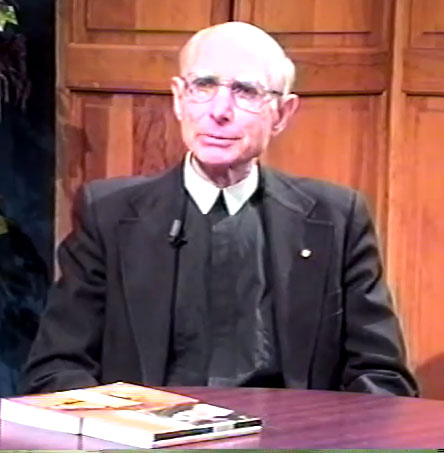 [powerpress]Bruce and I had a chance to speak with Brother Joseph Schmidt about St. Therese. He wrote about her in “Everything is Grace”.
[powerpress]Bruce and I had a chance to speak with Brother Joseph Schmidt about St. Therese. He wrote about her in “Everything is Grace”.
This is my VERY favorite book about St. Therese…it’s wonderful
MY ONLY OCCUPATION IS LOVE
“I do not desire either suffering or death, although both are appealing to me;
it is love alone which really attracts me…
I can ask for nothing with any enthusiasm
except the perfect accomplishment of the Divine Will in my soul,
unhindered by any intrusion of created things.
I can say, with the words of our father, St. John of the Cross,
in his Spiritual Canticle,
‘I drank in the inner cellar of my Beloved, and when I went forth into the meadow
I forgot everything and lost the flock which I used to drive.
My soul has employed all its resources in His service;
now I guard no flock, nor do I have any other duties.
Now my only occupation is love.’
Or again: ‘I know love is so powerful that it can turn
whatever is good or bad in me into profit,
and it can transform my soul into Himself.”
~ St. Thérèse
A MORNING PRAYER WRITTEN BY ST. THERESE
O my God! I offer Thee all my actions of this day for the intentions and for the glory of the Sacred Heart of Jesus. I desire to sanctify every beat of my heart, my every thought, my simplest works, by uniting them to Its infinite merits; and I wish to make reparation for my sins by casting them into the furnace of Its Merciful Love.
O my God! I ask of Thee for myself and for those whom I hold dear, the grace to fulfill perfectly Thy Holy Will, to accept for love of Thee the joys and sorrows of this passing life, so that we may one day be united together in heaven for all Eternity.
Amen.
PRAYER TO ST. THERESE
 O little St. Theresa of the Child Jesus, who during your short life on earth became a mirror of angelic purity, of love strong as death, and of wholehearted abandonment to God, now that you rejoice in the reward of your virtues, cast a glance of pity on me as I leave all things in your hands. Make my troubles your own – speak a word for me to our Lady Immaculate, whose flower of special love you were – to that Queen of heaven “who smiled on you at the dawn of life.” Beg her as the Queen of the heart of Jesus to obtain for me by her powerful intercession, the grace I yearn for so ardently at this moment, and that she join with it a blessing that may strengthen me during life. Defend me at the hour of death, and lead me straight on to a happy eternity.
O little St. Theresa of the Child Jesus, who during your short life on earth became a mirror of angelic purity, of love strong as death, and of wholehearted abandonment to God, now that you rejoice in the reward of your virtues, cast a glance of pity on me as I leave all things in your hands. Make my troubles your own – speak a word for me to our Lady Immaculate, whose flower of special love you were – to that Queen of heaven “who smiled on you at the dawn of life.” Beg her as the Queen of the heart of Jesus to obtain for me by her powerful intercession, the grace I yearn for so ardently at this moment, and that she join with it a blessing that may strengthen me during life. Defend me at the hour of death, and lead me straight on to a happy eternity.
Amen
Tags: catholic, catholic podcast, catholic prayer, cathollc spirituality, heart, joseph schmidt, joy, love, St. therese little flower, st. therese of lieseux, THERESE
This entry was posted on Saturday, October 1st, 2011 at 12:02 am
You can follow any responses to this entry through the RSS 2.0 feed.
No surprise to readers and listeners of Discerning Hearts (especially those who follow the teachings of Deacon James Keating)….”Silence is Golden”! Pope Benedict XVI has chosen “Silence and Word” as the theme for World Communication Day.
Deacon James Keating)….”Silence is Golden”! Pope Benedict XVI has chosen “Silence and Word” as the theme for World Communication Day.
Don’t you just love it…earlier we heard from Vatican Radio that the symposium of former theological students of the Holy Father that met with him this past summer reflected on what exactly is meant by the “new evangelizaation”. As reported it ultimately comes down to HUMILITY Â (click here to read and to listen to more on this report).
“Silence and Word” is the path to humility? It works for me!
From Vatican Radio:
[powerpress = Vatican-Radio]
The Pontifical Council for Social Communications on Thursday announced the theme for the 2012 World Communications Day:Â Silence and Word: path of evangelization. Below is the text of a communique from the Council explaining the theme in context:
Statement from the Pontifical Council for Social Communications on the theme for the 2012 World Communications Day
The extra-ordinarily varied nature of the contribution of modern communications to society highlights the need for a value which, on first consideration, might seem to stand in contradistinction to it.
Silence, in fact, is the central theme for the next World Communications Day Message: Silence and Word: path of evangelization. In the thought of Pope Benedict XVI, silence is not presented simply as an antidote to the constant and unstoppable flow of information that characterizes society today but rather as a factor that is necessary for its integration.
Silence, precisely because it favors habits of discernment and reflection, can in fact be seen primarily as a means of welcoming the word. We ought not to think in terms of a dualism, but of the complementary nature of two elements which when they are held in balance serve to enrich the value of communication and which make it a key factor that can serve the new evangelization.
It is clearly the desire of the Holy Father to associate the theme of the next World Communications Day with the celebration of the forthcoming Synod of Bishops which will have as its own theme: The New Evangelization for the Transmission of the Christian Faith.
World Communications Day, the only worldwide celebration called for by the Second Vatican Council (Inter Mirifica, 1963), is celebrated in most countries, on the recommendation of the bishops of the world, on the Sunday before Pentecost (in 2012, May 20).
The Holy Father’s message for World Communications Day is traditionally published in
conjunction with the Memorial of St. Francis de Sales, patron of writers (January 24).
Tags: catholic, catholic podcast, catholic prayer, cathollc spirituality, pope benedict xvi, prayer, silence
This entry was posted on Thursday, September 29th, 2011 at 2:50 pm
You can follow any responses to this entry through the RSS 2.0 feed.
A Prayer to St. Lorenzo Ruiz
Beloved Lorenzo Ruiz, confronted with death, you proclaimed your readiness to die a thousand times for your Christian faith. Today the whole world admires your courage. We feel particularly proud of you as our brother. And we pray: You, a family man, protect our families. Keep them united in love. You, who bore your sufferings with patience and resignation, intercede for the sick of mind and body; help them to receive the grace of God’s miraculous healing. You, who died in a foreign country, take care of Filipinos living and working in this country and in other parts of the world. You, an example of Christian fortitude, sustain our faith and make it spread and grow strong all around us. You, the Philippines’ first saint, be the country’s special protector. Unite us as one people; help us to work in harmony for development and progress; and give us peace. Amen.(State your intentions). San Lorenzo Ruiz, pray for us.  Amen.
Tags: catholic, catholic podcast, catholic prayer, cathollc spirituality, Christian faith, filipino saint, martyrdom, Martyrdom of St. Lorenzo Ruiz, philippines, san lorenzo ruiz, st lorenzo ruiz, St. Lorenzo Ruiz Beloved Lorenzo Ruiz
This entry was posted on Wednesday, September 28th, 2011 at 12:58 am
You can follow any responses to this entry through the RSS 2.0 feed.
Special 6 – Interior Silence
[powerpress]
Interior Silence, in particular in the liturgy, is reflected upon by Deacon Keating.  He leads a meditation during a prayer service with priests, on the letter “Spiritual Formation in the Seminaries”  which calls for spiritual silence to be at the core of seminary formation.  Priests are called to be teachers of prayer and directors of spirituality.  Why silence is so vitally important and what are the blocks  to prevent it…the cynicism that reacts to the ideal. The role of discernment and diminishing interference.  If priests have trouble with this, imagine the challenge for the laity.
Deacon Keating is the Director of Theological Formation for the Institute for Priestly Formation at Creighton University.
Click here for more Deacon James Keating
Tags: catholic, catholic podcast, catholic prayer, cathollc spirituality, silence
This entry was posted on Tuesday, September 27th, 2011 at 9:22 am
You can follow any responses to this entry through the RSS 2.0 feed.
 The French priest St. Vincent de Paul (1581-1660) organized works of charity, founded hospitals, and started two Roman Catholic religious orders.
The French priest St. Vincent de Paul (1581-1660) organized works of charity, founded hospitals, and started two Roman Catholic religious orders.
Vincent de Paul was born into a peasant family on April 24, 1581, in the village of Pouy in southwestern France. He became a priest at the age of 19, and would go on to found hospitals, charitable organizations and many other ministries and works that would serve the needs of the poor. With Louise de Marillac, a talented and sensitive friend, he started the first religious group of women dedicated entirely to works of charity outside the cloister, a group called the Daughters of Charity.
Vincent was a man of action rather than of theory. The religious spirit he communicated was simple, practical and straightforward. He looked to Christ as his leader and tried to translate the Gospel message into concrete results. He died on Sept. 27, 1660, and was canonized a saint in the Roman Catholic Church in 1737.
Words of Wisdom
from St. Vincent de Paul
“No matter what others say or do, even if the wicked succeed, do not be troubled: commit everything to God and put your trust in him.â€
“The most powerful weapon to conquer the devil is humility. For, as he does not know at all how to employ it, neither does he know how to defend himself from it.”
“But do you know what it is to labor in charity? It is to labor in God, for God is charity, and it is to labor for God purely and entirely; it is to do so in the grace of God.”
A “Great Hero of Charity”
As reported by Zenit, the Holy Father spoke of St. Vincent de Paul:
The Pope reflected on the Gospel reading from today’s Mass, which recounts the story of the rich man suffering torment, and the poor man Lazarus in the bosom of Abraham.The message of the parable, the Holy Father said, “points out that while we are in this world we must listen to the Lord who speaks to us through the Scriptures and live according to his will, because, after death, it will be too late to make amends.”
“So,” he explained, “this parable tells us two things: The first is that [God] loves the poor and lifts them up from their humiliation; the second is that our eternal destiny is
 conditioned by our attitude; it is up to us to follow the road to life that God has shown us, and this is the road of love, not understood as sentiment but as service to others in the charity of Christ.”
The Bishop of Rome called it a “happy coincidence” that Monday marks the feast of one of the Church’s great heroes of charity, St. Vincent de Paul, patron of Catholic charitable organizations.
“In the France of the 1600s, he touched with his own hand the great contrast between the richest and the poorest,” the Pope said. “[…] Driven by the love of Christ, Vincent de Paul knew how to organize stable forms of service to marginalized persons.”
In fact, the saint founded the first women’s congregation to live their consecration “‘in the world,’ in the midst of the people, with the sick and the needy,” he noted.
The Pontiff added, “Dear friends, only Love with a capital ‘L’ makes for true happiness!” – Zenit
Tags: catholic, catholic podcast, catholic prayer, cathollc spirituality, daughters of charity, st vincent de paul
This entry was posted on Tuesday, September 27th, 2011 at 6:52 am
You can follow any responses to this entry through the RSS 2.0 feed.
Everytime we pray the rosary, we pray with Blessed Herman the Cripple. He’s the author of one of the most heartbreakenly beautiful prayers of all time….the Salve Regina.
 Blessed Herman (1013-1054) was born with many medical problems: cleft palate, cerebral palsy, and spina bifida. During his lifetime he was known as Blessed Herman the Cripple. Father Robert F. McNamara on his website, Saints Alive, calls him Blessed Herman the Disabled.
Blessed Herman (1013-1054) was born with many medical problems: cleft palate, cerebral palsy, and spina bifida. During his lifetime he was known as Blessed Herman the Cripple. Father Robert F. McNamara on his website, Saints Alive, calls him Blessed Herman the Disabled.
He was a remarkable man. Despite his daunting physical limitations he studied and wrote on astronomy, theology, math, history, poetry, Arabic, Greek, and Latin. He also built musical and astronomical equipment. He was considered a genius in his time. He wrote prayers and hymns – the most notable being the Salve Regina (Hail Holy Queen).
Father McNamara in his article on Blessed Herman the Disabled comments on the great meaning of Herman’s life with this closing insight:
“In his own day, the heroic cripple who achieved learning and holiness was called ‘The Wonder of His Age’.
In our day, many voices say that people with disabilities should be phased out of existence. Which were the Dark Ages, then or now!â€
Let us pray with Blessed Herman, and ask him to help us to receive the graces for the virtues we lack…humility, patience, kindness, and all the others which allow the love of Christ to shine in the world through us.
Prayers        [powerpress url=”http://discerninghearts.com/Devotionals/Hail-Holy-Queen.mp3″]Download (right click & choose “Save Link As”)
The Hail Holy Queen (The Salve Regina)
Hail, Holy Queen, Mother of Mercy, our life, our sweetness and our hope! To thee do we cry, poor banished children of Eve! To thee do we send up our sighs; mourning and weeping in this vale of tears! Turn, most gracious Advocate, thine eyes of mercy towards us, and after this, our exile, show to us the blessed fruit of thy womb, Jesus! O Clement, O loving, O sweet Virgin Mary! Pray for us O Holy Mother of God…That we may be made worthy of the promises of Christ. Amen. – Blessed Herman
The poem below is from Father Benedict J Groeschel’s book,
Stumbling Blocks or Stepping Stones.
Herman The Cripple
by
William B. Hurlbut, M.D.
I am least among the low,
I am weak and I am slow;
I can neither walk nor stand,
Nor hold a spoon in my own hand.
Like a body bound in chain,
I am on a rack of pain,
But He is God who made me so,
that His mercy I should know.
Brothers do not weep for me!
Christ, the Lord, has set me free.
All my sorrows he will bless;
Pain is not unhappiness.
From my window I look down
To the streets of yonder town,
Where the people come and go,
Reap the harvest that they sow.
Like a field of wheat and tares,
Some are lost in worldly cares;
There are hearts as black as coal,
There are cripples of the soul.
Brothers do not weep for me!
In his mercy I am free.
I can neither sow nor spin,
Yet, I am fed and clothed in Him.
I have been the donkey’s tail,
Slower than a slug or snail;
You my brothers have been kind,
Never let me lag behind.
I have been most rich in friends,
You have been my feet and hands;
All the good that I could do,
I have done because of you.
Oh my brothers, can’t you see?
You have been as Christ for me.
And in my need I know I, too,
Have become as Christ for you!
I have lived for forty years
In this wilderness of tears;
But these trials can’t compare
With the glory we will share.
I have had a voice to sing,
To rejoice in everything;
Now Love’s sweet eternal song
Breaks the darkness with the dawn.
Brother’s do not weep for me!
Christ, the Lord, has set me free.
Oh my friends, remember this:
Pain is not unhappiness.
Tags: catholic, catholic podcast, catholic prayer, cathollc spirituality, hail holy queen, salve regina
This entry was posted on Monday, September 26th, 2011 at 12:52 am
You can follow any responses to this entry through the RSS 2.0 feed.

